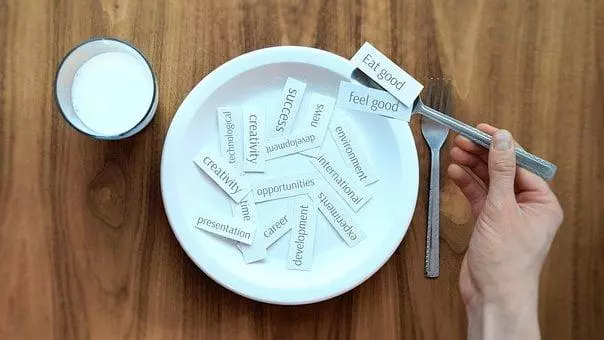This post contains affiliate links from which I may receive a small commission, at no extra cost to you. In no way does this affect my opinion or the information I provide on the product. Please read my disclaimer for more info.
It’s an all too common cycle: you wake up, eat breakfast on the go while you hurry to work. Then you grab a sandwich between two meetings and finally get home from your exhausting day only to splurge on way too many cookies while you stare at your phone.
Dinner isn’t far away— you absent-mindedly eat some comfort pizza in front of a movie to reward yourself for making it through the day. You then go to sleep and everything starts all over again.
Sounds familiar? With mindful eating, it’s possible to break the cycle— and get many health benefits in the process.
Here’s how.

What is mindful eating?
Mindful eating is a technique used to regain control over your eating habits. It’s based on mindfulness, a form of meditation.
Its goal is to focus your attention on the present experience, to be fully aware of your own thoughts, actions, and motivations.
Eating mindfully means being aware of what you eat, and eating consciously in a healthy and balanced way in order to rediscover taste, flavor, and pleasure.
The goal is to create a connexion between body and mind while eating. This can enable you to listen to what your body needs, to know when you are hungry and when you are full.
Mindful eating involves listening to your hunger cues. It means eating slowly, taking the time to chew, and noticing the different textures and flavors of your food. Eating should be done without any distractions, focused on appreciating your food.
It also involves connecting your food with your mind and body: thinking about what you want, what you need, what certain foods will or won’t bring to your body, along with their effect on your physical appearance and mental state.
A brief mindful eating history.
Mindfulness is a practice based on Zen Buddhism, stemming from their practice of mindful meditation. The term “mindfulness” was defined by Jon Kabat-Zin, the developer of the Mindfulness-Based Stress Reduction program around the 1980s.
He saw it as “paying attention in a particular way, on purpose, in the present moment, and nonjudgmentally”. The goal is to live more intentionally and to be able to manage anxiety, depression, pain, disease, and, more recently, one’s approach to eating.
Sure enough, after being used in clinical trials to help people manage their pain and stress, it was implemented clinically in weight management and has been successful [1, 2, 3].

The health benefits of mindful eating.
Most of our food patterns couldn’t be farther from mindful eating.
We live in a fast-paced world where we must optimize every second of our time. What we eat and how we eat it is essential to our health, yet we aren’t willing to sit down for a meal or to spend over five dollars on it.
We are surrounded by an abundance of food, especially very tempting highly processed choices. Furthermore, our outside world is buzzing with distractions: phones, computers, televisions…How can you focus on what you’re eating if all your attention is already elsewhere?
When you eat this way, it’s very easy to overeat since your brain doesn’t realize that you’re full right away. You then pile on the pounds and turn to emotional eating to feel better.
This obviously only worsens the situation and ingrains you deeper into a mindless eating cycle.
Mindful eating helps improve eating behaviors
It enables you to slow down and focus your attention on your food. It helps you distinguish your actual hunger cues from your emotional ones that make you eat without hunger. Although it isn’t its main goal, mindful eating will very often result in weight-loss.
It’s not a secret that most restrictive diets don’t work on most people. It’s very easy to return to your initial weight or even exceed it after a certain time spent eating a restrictive diet.
That’s because you aren’t changing your mentality or your relationship around food. Instead, you are (subliminally) telling yourself and your body that food is your enemy and must be highly restricted.
Mindful eating, on the other hand, enables you to change those unhealthy eating behaviors, reduces stress and helps you lose weight without it being the main focus.
Indeed, losing weight shouldn’t be your primary goal when you readjust your dieting habits. Being healthier and feeling great should be, and in most cases, weight-loss will follow.

The great thing is— the weight stays off. That’s because studies show that mindful eating helps you address the root of the problem, which is often a mix of bad eating behaviors and poor food choices.
There’s no reason to gain the weight back because you aren’t restricting yourself from anything. In addition, a review [4] of studies found that mindful eating reduces the frequency and impact of binge eating episodes. It can also reduce emotional eating by helping you control your impulses.
With mindfulness-based interventions, eighteen out of twenty-one studies reviewed [5] showed improvement in eating behaviors.
Overall, the results support the effectiveness of mindfulness interventions to improve obesity-related eating behaviors [6].

Mindful eating can lead to weight-loss
In addition, the link between mindfulness and obesity was studied [7] with the MAAS (Mindful Attention Awareness Scale). On this scale, the higher the score, the higher the state of mindfulness.
Participants with low MAAS scores compared to those with high scores were more likely to be obese. In addition, participants with a low MAAS score had greater android fat and a higher android/ gynoid fat ratio.
Android fat is found in your stomach area and can be an important risk factor for cardiovascular and metabolic diseases.
Furthermore, participants who were not obese as children and who became obese as adults had lower MAAS scores than participants who were not obese children or adults.
Therefore, the disposition to mindfulness can be inversely associated with obesity and adiposity. Basically, the more mindfully you eat, the less chance you have of becoming fat or obese. So…how do you do it?
How to eat mindfully.
Pay close attention to your food
Mindful eating starts with your grocery shopping. It’s important to take the time to make a healthy list and stick to it. Both your list and your shopping should be done after having a healthy, filling meal so you aren’t tempted to splurge.
You should also take the time to consider how healthy each item in your cart is and what it will bring to your body. A few treats may have their place as they are good for your soul— as long as they’re eaten in moderation.
It’s also a good practice to consider where your food comes from, the people involved in the meal (from growing it all the way to preparing it), the elements it involes, etc. This will help you be more connected with your food and make more conscious choices.
Be in tune with your body’s signals
Secondly, it’s important to listen to your hunger cues instead of your emotional ones. When your stomach is growling and your energy is low, it’s probably time for you to eat.
The intuitive eating hunger scale is a tool that can be used to help you identify your level of hunger or fullness. It helps you be more in tune with your body’s signals and enables you to self-regulate.
The scale goes from 1 to 10, 1 being ravenous, 10 being achingly full, and 5 being a neutral middle ground. The idea is to position yourself on the scale before, during, and after a meal, and to adapt your food intake accordingly.
Here’s an article I wrote about using the intuitive eating hunger scale here.
If you are just bored and want to fill up some time, or if you’re not feeling amazing and want some comfort, you should try to find an activity that you love and that relaxes you instead of eating.
Here’s an article I wrote on how to prevent boredom eating if you’re interested.
Take your time to eat
Once it’s time to eat, make sure to sit down at a table without any distractions and use proper silverware. Take the time to cut your food, then put it in your mouth and asses its aspect and taste.

Chew slowly and take breaks between bites. It’ll feel a little odd at first, but you should try to appreciate each bite as if you were eating the food for the first time.
In addition, you should pause throughout the meal and ask yourself if you are still hungry. You shouldn’t force yourself to finish your plate if you’re full. Instead, note how much is left and try to adapt your portion size the following meal.
Listen to your emotions
Another important aspect is being in touch with your emotions. How do you feel before eating? During? After? In the beginning, don’t hesitate to write it down. You might be able to discern a pattern between how you’re feeling and what you are putting in your body.
This could help you realize what your emotional triggers are and how they reflect on how you eat. Once you’ve acknowledged them, it’ll be easier to work on making them disappear for good.
It can also help to think about your food, its nutritional content, how it was made, its purpose for your body, etc.
These practices require time and effort, but after awhile it will become much easier. Don’t hesitate to turn to a mindfulness coach or to online exercises to help you. Mindfulness-based interventions offer exercises on self-acceptance, conscious eating, and mindfulness training.
They may be a good place to start to get all of the health benefits of mindful eating.
Another good place to start would be by reading a book about mindful eating. This one will help you understand your eating cycle, teach you tips and exercises on mindful eating, help you with your self-control, help overcome your binge-eating, and more!

Mindful eating in conclusion…
Mindful eating has many health benefits and can help you regain control over your eating habits. Its goal is to focus your attention on the present experience and to eat slowly and consciously in a healthy and balanced way. It also means listening to your hunger and fullness cues.
While diets dont usually work in the long run, mindfulness-based techniques will help you feel amazing and keep the weight off!
-Lucie
Don’t forget to follow me on Pinterest!
Have you ever heard of mindful eating? Have you ever tried it? If you have, do you have any tips and tricks to share?

